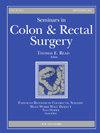Epidemiology, molecular biology, and genetics of sporadic young onset colorectal cancer
IF 0.5
Q4 SURGERY
引用次数: 0
Abstract
The incidence of colorectal cancer (CRC) in individuals under 50 years of age—termed young-onset colorectal cancer (YOCRC)—has been increasing despite declining rates of CRC overall. YOCRC now comprises up to 15 % of new CRC diagnoses. Most cases of YOCRC are sporadic, occurring without identifiable hereditary syndromes or family history. It exhibits distinct epidemiological and molecular characteristics, including a predilection for rectal and left-sided tumors, aggressive histology, and more advanced stage at diagnosis. Suspected risk factors contributing to this rising incidence are multifactorial and include lifestyle and environmental exposures, such as westernized diets, obesity, sedentary behavior, increased antibiotic exposure, and chronic inflammation. These factors interact with the gut microbiome to induce dysbiosis, pro-inflammatory states, and DNA damage. At the molecular level, YOCRC is most associated with chromosomal instability (CIN), while a minority exhibit microsatellite instability (MSI) or CpG island methylator phenotype (CIMP). Compared to late-onset CRC, YOCRC displays lower rates of KRAS, BRAF, and APC mutations, but increased TP53 and PTEN alterations. Emerging research also highlights differences in the tumor microenvironment, including immune cell infiltration and complement expression, which may influence therapeutic response. Understanding the unique biology of sporadic YOCRC is essential for developing risk stratification models, refining screening strategies, and advancing targeted treatment approaches. Continued investigation into genetic susceptibility, environmental triggers, and tumor immunobiology will be crucial in addressing this evolving public health challenge.
散发性青年结直肠癌的流行病学、分子生物学和遗传学
尽管总体上结直肠癌发病率有所下降,但50岁以下人群的结直肠癌(CRC)发病率一直在上升,这被称为年轻发病的结直肠癌(YOCRC)。YOCRC现在占新结直肠癌诊断的15%。大多数YOCRC病例是散发的,没有可识别的遗传综合征或家族史。它表现出独特的流行病学和分子特征,包括直肠和左侧肿瘤的偏好,侵袭性组织学,诊断时更晚期。导致发病率上升的可疑危险因素是多因素的,包括生活方式和环境暴露,如西化饮食、肥胖、久坐行为、抗生素暴露增加和慢性炎症。这些因素与肠道微生物相互作用,诱导生态失调、促炎状态和DNA损伤。在分子水平上,YOCRC与染色体不稳定性(CIN)最相关,而少数表现为微卫星不稳定性(MSI)或CpG岛甲基化表型(CIMP)。与晚发性CRC相比,YOCRC表现出较低的KRAS、BRAF和APC突变率,但TP53和PTEN的改变增加。新兴研究还强调了肿瘤微环境的差异,包括免疫细胞浸润和补体表达,这可能会影响治疗反应。了解散发性YOCRC的独特生物学特性对于建立风险分层模型、完善筛查策略和推进靶向治疗方法至关重要。对遗传易感性、环境触发因素和肿瘤免疫生物学的持续研究对于解决这一不断演变的公共卫生挑战至关重要。
本文章由计算机程序翻译,如有差异,请以英文原文为准。
求助全文
约1分钟内获得全文
求助全文
来源期刊

Seminars in Colon and Rectal Surgery
SURGERY-
CiteScore
0.60
自引率
0.00%
发文量
43
期刊介绍:
Seminars in Colon and Rectal Surgery offers a comprehensive and coordinated review of a single, timely topic related to the diagnosis and treatment of proctologic diseases. Each issue is an organized compendium of practical information that serves as a lasting reference for colorectal surgeons, general surgeons, surgeons in training and their colleagues in medicine with an interest in colorectal disorders.
 求助内容:
求助内容: 应助结果提醒方式:
应助结果提醒方式:


